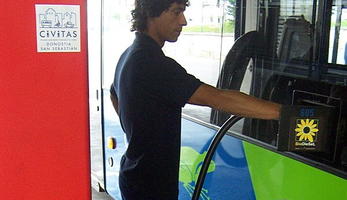Biofuels and clean vehicles
Basic Information
Mobility solution ID
4
Timeline
- complete
Project
Thematic areas
Summary
DonostiaBus (DBUS) implemented different types of alternative propulsion at a significant scale and acted as a local showcase for the use of alternative fuels. By introducing high blends of biodiesel, EEV buses and hybrid vehicles the city aimed to reduce emissions of air pollutants and greenhouse gasses.
Implementing sustainable mobility
The use of new fuels and vehicle technologies is an important step in reducing dependency on fossil fuels, bringing down emissions and particulate matter levels and increasing energy-efficiency. Donostia-San Sebastian had an ambitious plan to achieve these goals by introducing high biodiesel blends and new vehicle technologies in its public transport fleet.
The main objectives of the measure were to:
- Maximizing the opportunities for the take-up of second generation bio-fuels and EEV vehicles by gradually introducing the use of biodiesel from used cooking oils in the bus fleet of DBUS well beyond EU RTFO requirements.
- Reducing air pollutant and GHG emissions by renewing DBUS’ vehicle fleet (30 EEV buses and one hybrid bus) and using bio-diesel at high blends (up to B100) at a large scale in the city
The city wished to act as a local showcase and promotional actions were planned to convince also other fleet operators and individual car users to switch. Further future innovations in clean vehicles, like second-generation bio-diesel, hydrogen and hybrids were considered in a comparative study.
Progress
A biodiesel mixing station has been operational since December 2008 and has yielded excellent results. The mixing station allows the possibility to adapt the percentage biodiesel mix to the technical needs of each individual bus. The company has been gradually increasing the biodiesel blend throughout the CIVITAS demonstration period. At the end of the demonstration period 95 out of 120 buses were running on a B-30 blend, 15 buses with B-50 and 6 buses with B-100.
In 2010 and 2011 promotion campaigns were organised around the collection of used cooking oils and its use as fuel for the urban buses. The aim was to raise awareness among passengers and other fleet operators about the use of clean fuels. The bus company has trained drivers and technical staff in the use and maintenance of the new vehicles and biodiesel blends. This includes eco-driving courses to counteract the overconsumption of fuel due to the lower energy content of biodiesel compared to conventional diesel.
To further improve the environmental performance of the urban bus service, DonostiaBus introduced 31 new EEV vehicles and one Mann Lion´s City serial Hybrid bus to its operational fleet. As a complementary action to the introduction of biodiesel in the city bus fleet, the Municipality started using biofuel in 82 municipal vehicles. Also the Municipality has introduced 13 hybrid cars and 7 electric vehicles among the Municipal Police, the Mobility Department and the Town Hall services, as well as 4 electric bicycles.
Outcomes
The measure has succeeded in reaching its main objective: an improved environmental performance of the public transport fleet. The relative annual reduction of pollutant emissions is above 20%, ranging from 20,15% for CO2 emissions to a 45,33% reduction achieved for particulate matter. In absolute terms, the use of biofuel has meant a reduction of 1.707 tonnes of CO2 emissions in 2011. While local pollutants emission saving nearly reached 81,3 tonnes in the same year (24,3 tonnes of CO; 6,7 tonnes of HC; 47,7 tonnes NOx and 2,57 tonnes PM).
As already expected, the use of biofuels has led to increased fuel consumption. Together with the increased requirements for maintenance this has resulted in higher operation and maintenance costs. Nevertheless, a significant impact on the energy side is the decreased dependency on fossil fuels for the operation of this service. The balance between cost and benefits has been calculated in a Cost Benefit Analysis, which resulted in a BCR of 0,96 meaning, that the costs are somewhat larger than the benefits. The price of biodiesel in relation to conventional diesel is therefore and important indicator for the future use of biodiesel.
As for the public perception of the measure, a survey among public transport users has revealed that environmental issues are perceived as very important, with an average score of 8,96.









